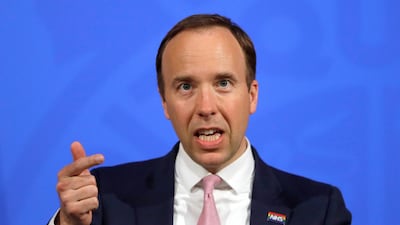Plans to speed up vaccine development to prevent future pandemics and save lives will be boosted by a UK-hosted summit to raise investment from the international community.
Foreign Secretary Dominic Raab and Health Secretary Matt Hancock announced on Friday that the UK will host the summit in 2022 to support the work of the Coalition for Epidemic Preparedness Innovations.
“Ultimately, we need to be prepared for future pandemics," Mr Raab said. "As we set out in the integrated review, we all need to work together to solve this global challenge.”
“CEPI’s work will help to build a safer world for us all.”
The coalition aims to speed up the development of vaccines for emerging infectious diseases, such as Covid-19, and enable equitable access to them globally.
Its five-year strategy plans to reduce or even eliminate the future risk of pandemics and epidemics.
The coalition’s ambitions include cutting vaccine development times down to 100 days, or about a third of the time it took the world to develop a Covid-19 vaccine.
British Prime Minister Boris Johnson backed this goal before the G7 leaders’ meeting in February.
It is supported by the UK government’s new Pandemic Preparedness Partnership to save lives from future diseases and prevent another pandemic.
The partnership was formed in April and will advise the UK G7 Presidency on how to meet the Mr Johnson’s ambition to slash the time to develop and distribute high-quality vaccines.
It will be backed by additional funding to support the coalition's work on global vaccine innovations.
“The UK’s leadership in developing a vaccine that can be used around the world has been vital in the fight against Covid-19,” Mr Hancock said.
“We look forward to working with CEPI to speed up vaccine development, creating a global solution to ensure we’re better prepared for future pandemics.”
The UK will host the G7 Foreign and Development Ministers meeting on May 3 to 5, where global health will be on the agenda.
As part of the UK’s G7 presidency this year, the government is working with leaders and countries around the world to ensure lessons are learnt from the Covid-19 pandemic.
It will work collaboratively to strengthen collective defences and build a global health system, so the world can be better protected against future pandemics.
The UK is one of the largest donors to the Covax AMC, providing £548 million ($764.7m) for the scheme.
Covax has so far shipped more than 49 million Covid-19 vaccines to 120 countries and territories.
CEPI played a vital role in the formation of Covax and co-leads the initiative alongside the World Health Organisation, Gavi, and Unicef.
This year, the UK also secured a UN Security Council resolution, sponsored by 112 countries, for ceasefires in conflict zones to allow vaccine deliveries to some of the world’s most vulnerable people.
To help with their mission to end future pandemics, the government has provided £276m to CEPI since 2018.


